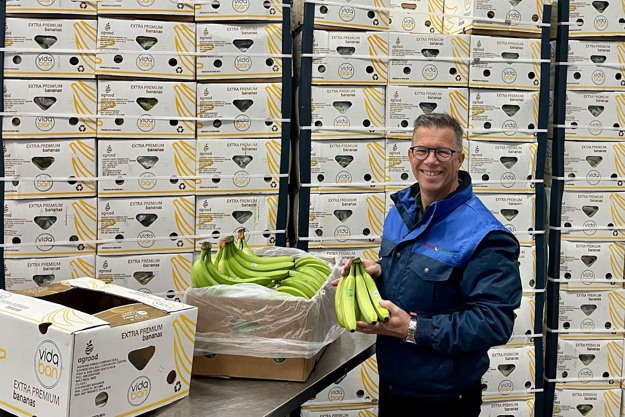Container ships are queuing off the coast of Panama, the northwest of South America is experiencing volatile weather, plant diseases are a constant threat to growers, and global inflation affects every link in the chain, right down to consumers. Yet, bananas continue coming to Europe and do well in the supermarket. All these things will not keep, perhaps the world's most popular fruit, down.

The Dutch company Anaco & Greeve International (AGI) gets its bananas from Costa Rica, Colombia, Ecuador, Guatemala, and the Dominican Republic, from the latter only organic bananas. "Ecuador has been gaining a greater foothold in Europe recently. It's strong in the Mediterranean, and just recently, I read that the Netherlands is the fourth-largest Ecuadorian banana importer. I know of at least three retailers in Germany and some in Poland that have switched to that country of origin. But that isn't necessarily the case with us," begins Robert Greeve. That also immediately explains why Anaco Greeve is not affected by the dry Panama Canal. The company's other countries of origin can all operate from ports in the Caribbean Sea.
"Guatemala is picking up nicely this year, especially in Northern Europe, partly because the shipping companies have optimized their services with higher load capacities and shorter transit times. That's still 21 days, but before, the country had no direct service. The fruit had to go to other ports and then be shipped to Europe. That easily adds an extra week and is less reliable. On the plus side, container rates are slightly lower than last year. Were it not for the dry Panama Canal, they might have been slightly cheaper, although, of course, that's speculation."
"The climate will be an issue in the future"
El Niño affects numerous fruit crops, especially avocados, blueberries, and grapes, in various countries, primarily Peru. Its impact on banana crops, though less significant, should not be minimized. Last October, the Ecuadorian banana organization Aebe estimated that 50,000 hectares of plantations in the country were lost due to that weather phenomenon. "I've heard Colombia, too, will have some problems, mainly due to drought and heat. The climate will undoubtedly be an issue in the future, not only for bananas but all fruits and vegetables worldwide," says Robert.
AGI is growing considerably in the organic segment. "The quality is improving, although it depends a bit on the country. Every year, we import more volumes, and almost all of them are in programs. It's no riskier to transport organic products than conventional, but the extra price in stores, though much smaller than ten years ago, is still justified. That differs by no more than €1.50/kg."
Small organic bananas for kids
According to Robert, there are many small-scale organic growers In the Dominican Republic, while Ecuador can often present slightly better quality due to its scale. "Peru also has organic, but we don't get our bananas from there; there are problems every year. The organic bananas from Colombia, Ecuador, and Peru are about the same size as their conventional counterparts, while those from the Dominican Republic are generally somewhat smaller. But that's catching on because people often buy organic bananas for their kids. Being slightly smaller helps then," he says.
The importer no longer sources bananas from the Canary Islands. "We used to, but not anymore. There's just no demand for them. We tried selling them as 'Spanish bananas,' but it's difficult. Say we market South American bananas for €1 a kilo, then we have to charge at least €1.50 for Canary Island bananas because of the higher purchase price. Plus, they're smaller and don't look as nice. They are, admittedly, tastier, but there's no demand for them in Northern Europe. In Spain itself, though, they sell like hot cakes."
"The time of a euro per kilo is over"
Greeve does not believe store prices will drop below €1.50/kilo bag. "The time of bananas for €1 is definitely over," he reckons. "Prices will fluctuate between €1.50 and €2, also for B bananas. There's not as much difference between A and B bananas as before. Per box, the B grades are €1 to €1.50 cheaper. There's plenty of room for B brands because, nowadays, many German retailers have private labels. We no longer do anything else, either." Younger consumers are a little less fussy in their choice of fruit. They accept B-brands more easily, with convenience being paramount.
The economy is scaling up on all levels. Anaco & Greeve International has a ripening capacity of about 35,000 boxes per week and is one of the few remaining ripeners in the Netherlands. "We choose to ripen a little longer than four days, which benefits quality. The method itself hasn't changed much over the years; it's just the ripening cells that have become more economical," Robert concludes. As mentioned, the banana sector is advancing steadily and unperturbed in these turbulent times of change.
Robert Greeve![]() Anaco & Greeve
Anaco & Greeve
ABC Westland 666
2685 DH Poeldijk
Tel: 0174-210200
[email protected]
www.anacogreeve.nl
